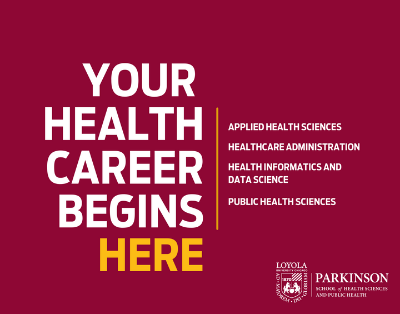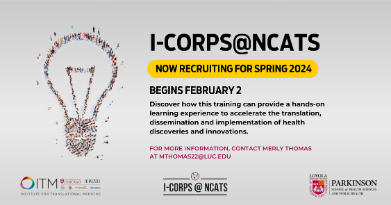2023 Loyola Chicago Health Equity Quest
Climate Change and Healthcare Delivery Summit
Wednesday, November 8, 2023
8:30am–5:00pm CT
Submit your questions for the panelists at matter.socialqa.com
A letter from the dean
Welcome to the 2023 Loyola Chicago Health Equity Quest focused on Climate Change and Healthcare Delivery!
Climate change is the single biggest health threat facing humanity. If the health sector were a country, it would be the fifth-largest greenhouse gas emitter on the planet. We must address climate change as an integral part of healthcare delivery and activate all parts of the health sector for sustainable change.
At Loyola Chicago we are called to collaborate in the care of our Common Home, “mother earth.” We are inspired by Pope Francis to respond to those suffering from environmental and climate injustice and solve the “environmental, public health, cultural and social challenges” posed by climate change. We require “efficient and flexible means of practical implementation” to move beyond goals and proposals to real action and impact.
Today’s Summit brings together national thought leaders, innovators and stakeholders from community organizations, government, industry and academia to critically discuss health inequities caused by climate change and discuss how to make healthcare delivery more sustainable.
I’m delighted to welcome our keynote speaker, Dr. Jalonne White-Newsome, our nation’s first Federal Chief Environmental Justice Officer at the White House Council on Environmental Quality. Welcome to our moderators and panelists sharing their time and wisdom with us today, and thank you for attending the Summit either in-person or via livestream.
We believe it will take true collaboration across multiple disciplines and sectors across the entire health continuum to solve, scale and sustain innovations that answer the call to action for providing equitable health care delivery, building resilient communities, and reducing healthcare’s carbon footprint in an era of dire climate change emergency.
We look forward to embarking on this urgent journey together!

 Elaine H. Morrato, DrPH, MPH, FISPE, CPH
Elaine H. Morrato, DrPH, MPH, FISPE, CPH
Founding Dean and Professor
Parkinson School of Health Sciences and Public Health, Loyola University Chicago
Thank you to our Sponsors and Supporters!
We are grateful for Bob and Betty Parkinson and the Parkinson Innovation Fund for generously supporting today’s Summit through its support of the Parkinson School of Health Sciences and Public Health, Center for Health Innovation and Entrepreneurship, at Loyola University Chicago.
Many thanks to our Summit partner MATTER, the Summit planning committee and collaborators, including Loyola University Chicago’s Baumhart Center for Social Enterprise & Responsibility, Institute for Racial Justice, Office of Sustainability, and School of Environmental Sustainability; and the Geneva Sustainability Centre, powered by the International Hospital Federation; the Health Care Council of Chicago; the Institute for Translational Medicine; RUSH University; and the Women’s Health Initiative Inc.
 Loyola University Chicago Baumhart Center for Social Enterprise & Responsibility
Loyola University Chicago Baumhart Center for Social Enterprise & Responsibility
Loyola University Chicago Center for Health Innovation and Entrepreneurship
Loyola University Chicago Institute for Racial Justice
Loyola University Chicago Office of Sustainability
Loyola University Chicago School of Environmental Sustainability


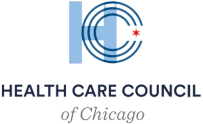
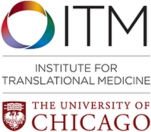

Agenda
8:30am | Breakfast
9:00am | Welcoming comments
9:30am | Keynote: Dr. Jalonne White-Newsome, Federal Chief Environmental Justice Officer of the White House Council on Environmental Quality
10:20am | Break
10:35am | Panel: Building resilient communities
11:50am | Lunch
12:50pm | Panel: Reducing health inequities caused by climate change
2:05pm | Break
2:20pm | Panel: Reducing healthcare’s carbon footprint
3:35pm | Closing comments
3:50pm | Networking reception
5:30pm | Event concludes
Keynote speaker
Bridging the gap: Climate justice and health equity
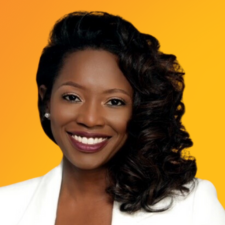 Dr. Jalonne White-Newsome
Dr. Jalonne White-Newsome
Federal Chief Environmental Justice Officer
White House Council on Environmental Quality
Dr. Jalonne L. White-Newsome joined the Biden-Harris Administration in June 2022 as the senior director for environmental justice at the White House Council on Environmental Quality. Under her leadership, the environmental justice team is working to deliver on President Biden’s ambitious environmental justice agenda, including implementing the recently signed Environmental Justice Executive Order, releasing the first-ever Environmental Justice Scorecard, advancing the Justice40 Initiative and launching the White House Campaign for Environmental Justice. Dr. White-Newsome became the first-ever federal chief environmental justice officer in 2023.
A native of Detroit, Michigan, Dr. White-Newsome has tackled environmental challenges from a wide range of positions and perspectives, including in the grassroots environmental justice movement, environmental philanthropy, state government, private industry and academia. Before joining the White House, Dr. White-Newsome founded and led Empowering a Green Environment and Economy, LLC (EGE2), a strategic consulting firm that focused on transforming communities by using people-centered solutions to combat climate change, improve public health, pursue environmental justice and advance racial equity. She also served as the first director of federal policy for WE ACT for Environmental Justice, managing their federal policy office in Washington, D.C. Dr. White-Newsome’s early environmental justice advocacy and research has focused on air pollution, climate-driven extreme heat and flooding and improving the health of low-income communities of color.
Dr. White-Newsome earned a PhD in environmental health sciences from the University of Michigan School of Public Health, a master’s degree in environmental engineering from Southern Methodist University, a bachelor’s degree in chemical engineering from Northwestern University and a certificate in diversity and inclusion from Cornell University. She is a proud wife and mother of her daughters.
Event emcee
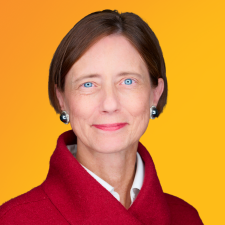 Elaine H. Morrato, DrPH, MPH, FISPE, CPH
Elaine H. Morrato, DrPH, MPH, FISPE, CPH
Founding Dean and Professor
Parkinson School of Health Sciences and Public Health, Loyola University Chicago
Dean Elaine Morrato, DrPH, MPH, FISPE, CPH, is Professor and Founding Dean of the Parkinson School of Health Sciences of Public Health. Trained in epidemiology at Johns Hopkins University and board-certified in public health, Dean Morrato’s scholarly activity focuses on accelerating the translation of health innovation into practice and policy, with a special interest in drug safety.
Under Dean Morrato’s leadership, the Parkinson School embraces interdisciplinary education and entrepreneurship to address the social determinants of health and achieve the health equity goal of access to good health for all. Parkinson faculty advance knowledge through innovative research, educate students to become successful health professionals, and inspire a vigorous commitment to service leadership. In addition to its academic departments, Parkinson is home to the university’s Center for Health Outcomes and Informatics Research (CHOIR) and the Center for Health Innovation and Entrepreneurship (CHIE).
Dean Morrato serves as Loyola University Chicago’s principle investigator in the multi-institutional collaborative Institute of Translational Medicine (ITM) with the University of Chicago, Rush University, NorthShore University Health System, Advocate Aurora Health, and the Illinois Institute of Technology. Supported by the National Institutes of Health, the ITM advances health toward health equity throughout Chicago.
In addition, Dean Morrato serves as a mentor, and founding contributor, to the national expansion of the Innovation-Corps (I-Corps)™ training program at NCATS for ensuring problem-solution fit and the scale-up and sustainability of academic health innovation. Dean Morrato regularly advises the U.S. Food and Drug Administration on issues of pharmaceutical risk management. Dean Morrato has been inducted into the Institute of Medicine of Chicago, an interdisciplinary group of professionals dedicated to improving public, population, and community health, and is recognized as a Fellow of the International Society of Pharmacoepidemiology.
Welcome remarks
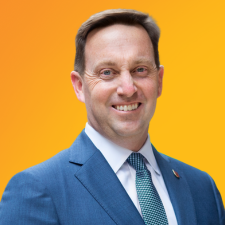 Mark C. Reed, EdD
Mark C. Reed, EdD
President
Loyola University Chicago
Dr. Mark C. Reed is the 25th president of Loyola University Chicago. He has been a distinguished leader and educator at Jesuit institutions for more than 20 years.
Prior to his appointment at Loyola, Dr. Reed served as president of Saint Joseph’s University and in multiple roles, including Senior Vice President, at Fairfield University.
Dr. Reed is a product of Jesuit, Catholic education. He earned his BS in mathematics and MBA from Fairfield University, and a MEd in secondary educational administration from Boston College. He earned his EdD in higher education management from the University of Pennsylvania.
Panel: Building resilient communities
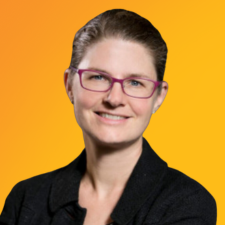 Moderator: Karen Weigert
Moderator: Karen Weigert
Director, Baumhart Center for Social Enterprise and Responsibility
Loyola University Chicago
Karen Weigert is a transformational leader with a deep track record across sectors. In her work, she focuses on the practical ways we can create thriving communities in an inclusive economy on a healthy planet.
She serves as the Director of the Baumhart Center for Social Enterprise and Responsibility at Loyola University Chicago, focused on the intersection of profit and purpose. At Baumhart, she leads the Baumhart Scholars, an MBA program 100% focused on social and environmental impact, and broader engagement and thought leadership directed on using business skills to address the challenges of our times.
Previously, Karen served as Executive Vice President of Slipstream, a nonprofit focused on accelerating climate solutions. There she led the Chicago office and national finance team. From 2011 to 2016 Karen served as the first Chief Sustainability Officer for the City of Chicago, building innovative pathways and solutions to make Chicago more livable, competitive and sustainable, including the award-winning Sustainable Chicago Action Agenda, Retrofit Chicago and the Energy Benchmarking ordinance.
Karen brings broad-based communications expertise to her work, currently serving as the sustainability contributor for WBEZ’s Reset, and previously appearing on CBS This Morning, the Wall Street Journal, Chicago Tribune, and Crain’s.
 Panelist: Ayesha Jaco
Panelist: Ayesha Jaco
Executive Director
West Side United
Ayesha Jaco is an award-winning nonprofit executive, choreographer, and creative director with a track record of building pioneering social impact brands and convening innovative community-led initiatives. Over the past 20 years, her Chicago-based work has leveraged local community-led initiatives to national platforms awarding over $20 million in funding and investments to Chicago residents and organizations. She currently serves as the executive director of West Side United (WSU). Under her leadership, WSU’s contributions to racial and health equity efforts in Chicago are referenced in the Harvard Business Review (March-April 2022), MIT’s Sloan Management Review and the New England Journal of Medicine.
Ayesha is a 2021 Leadership Greater Chicago Signature Fellow. She is the recipient of the Helen & Tim Meier Charitable Foundation Meier Achievement Award. She has completed dance residences with the Museum of Contemporary Art, Rebuild Foundation and Ragdale Foundation. Ayesha is also a 2018 Chicago Dancemakers Forum Lab Artist. She serves on the board for Choose Chicago, Rush University Medical Center and University of Chicago Medicine Translational Medicine External Advisory Board, and the Chicago Chronic Condition Equity Network Community Stakeholder Board.
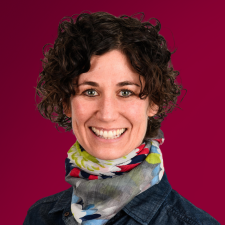 Panelist: Elena Grossman
Panelist: Elena Grossman
Program Director, Climate and Health Institute
University of Illinois Chicago
Elena Grossman is a senior research specialist at the UIC School of Public Health and has been working in the area of climate change, health and equity for over 10 years. She is currently the program director of the Climate and Health Institute that is intended to increase knowledge and awareness among civic leaders, public health professionals and community members on climate change, its public health impacts and its disproportionate impact on environmental justice communities. She is part of the UIC Community Research on Climate and Urban Science (CROCUS) team with an emphasis on the community engagement component.
She is also a lecturer for Yale University’s Climate Change and Health Certificate program. She served as the program director for the Building Resilience Against Climate Effects in Illinois (BRACE-Illinois) project, which was a partnership between the University of Illinois at Chicago School of Public Health and the Illinois Department of Public Health to help prepare Illinois for the health effects from climate change. Ms. Grossman was a Peace Corps volunteer in Guatemala and received her BA from Franklin and Marshall College and her MPH from University of Illinois at Chicago School of Public Health.
 Panelist: Linda Rae Murray
Panelist: Linda Rae Murray
Former President, American Public Health Association
Former CMO, Cook County Health System
Dr. Murray has spent her career serving the medically underserved. She has worked in a variety of settings including practicing occupational medicine at a Workers’ Clinic in Canada and serving as residency director for occupational Medicine at Meharry Medical College and bureau chief for the Chicago Department of Health under Mayor Harold Washington. Dr. Murray worked as medical director of the federally funded health center, Winfield Moody, serving the Cabrini Green Public Housing Project in Chicago. Dr. Murray has been an active member of a wide range of local and national organizations including serving as a member of the board of scientific counselors for the Agency for Toxic Substances and Disease Registry (ATSDR), the board of scientific counselors for the National Institute of Occupational Safety and Health (NIOSH) and the board of directors of Trinity Health.
In 1997, Dr. Murray returned to the Cook County Health System where she served as chief medical officer – Primary Care for the twenty-three primary care and community health centers comprising the ambulatory & community health network of the Cook County Bureau of Health Services, and as an attending physician in the division of occupational and environmental medicine at Cook County Hospital. Dr. Murray has worked in leadership roles in many public health organizations including the National Association of City & County Health Officers’ (NACCHO) health equity and social justice team and the national executive board of APHA. During 2011, she served as president of the American Public Health Association. In December 2014, she retired from her position as the chief medical officer for the Cook County Department of Public Health of the Cook County Health & Hospital System, the PHAB-accredited and state-certified public health department for suburban Cook County. In December 2018, Dr. Murray stopped seeing patients as a voluntary attending in internal medicine ending over forty years of clinical practice.
Today she serves as an honorary attending of Cook County Health and is the interim director of undergraduate programs in the School of Public Health at the University of Illinois at Chicago. She serves on many local and national boards including the Chicago-based Health and Medicine Policy Research Group and chairs the board for the National Collaborative for Health Equity. She remains passionate about increasing the number of Black and Latinx health professionals and serves on the Urban Health Program Community advisory committee at the University of Illinois.
Dr. Murray is devoting the rest of her career to being an enthusiastic full-time trouble maker. She has been a voice for social justice and health as a basic human right for over fifty years.
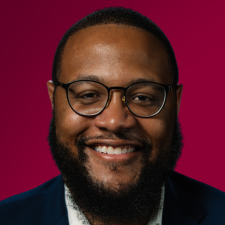 Panelist: Nelson Dunlap
Panelist: Nelson Dunlap
Vice President, Public Policy & External Affairs
Meharry Medical College
Nelson J. Dunlap, JD, currently serves as the vice president for public policy and external affairs in the Institute of Global Health Equity at Meharry Medical College. In this role, he helps to lead the health policy initiatives of the Institute, as well as the development of new partner relationships, all while keeping health equity centered at the core of the mission.
As a dedicated health policy advocate, author and experienced public speaker, Mr. Dunlap has utilized every opportunity in his career to fight on behalf of marginalized communities and push for the advancement of health equity. Before joining Meharry, Mr. Dunlap served as the chief of staff for the Satcher Health Leadership Institute at Morehouse School of Medicine where he helped to lead the government relations and health policy initiatives of the institution. Along with this role, Mr. Dunlap also served as the senior advisor for legislative affairs for the Health Equity Leadership and Exchange Network. In this position, Mr. Dunlap directed the grassroots efforts of the network as well as oversaw any research or reports published by the network.
Beginning with his selection to serve as the editor-in-chief of the DePaul Journal of Health Care Law and coupled with his tenure as an executive student board member of the Mary and Michael Jaharis Health Law Institute, Mr. Dunlap has long understood and embraced the vital role that academia can play in leading the charge in addressing health disparities. Mr. Dunlap’s passion for shaping the minds of the next generation of learners and leaders, and doing so with an eye toward leveraging the law and the political determinants of health, has afforded him the opportunity to provide numerous speaking engagements and author a number of publications centered around health policy and health disparities.
While Nelson Dunlap is originally from Austin, Texas, he is a recent transplant to the city of Nashville, Tennessee, where he and his wife, a registered nurse, hope to become integral members of the thriving healthcare community. Mr. Dunlap graduated from Texas Tech University with a bachelor of arts in political science and received his juris doctor from DePaul University College of Law.
Panel: Reducing inequities caused by climate change
 Moderator: Malik S. Henfield, PhD
Moderator: Malik S. Henfield, PhD
Founding Dean and Professor, Institute for Racial Justice
Loyola University Chicago
Malik S. Henfield, PhD, is Founding Dean and Professor of the Institute for Racial Justice (IRJ) at Loyola University Chicago. He received a BA in Biology from Francis Marion University, a MEd and EdS in School Counseling from The University of South Carolina, and a PhD in Counselor Education from The Ohio State University. Dr. Henfield has published multiple scholarly manuscripts and books, and delivered numerous national, regional, state, and local keynote addresses and professional presentations.
His scholarship situates Black students’ lived experiences in a broader ecological milieu to critically explore how their personal, social, academic, and career success is impeded and enhanced by school, family, and community contexts. His work to date has focused heavily on the experiences of Black students formally identified as gifted/high-achieving while his latest projects focus more exclusively on developing, implementing, and evaluating in and out of school interventions associated with preparing Black students for success in college and careers.
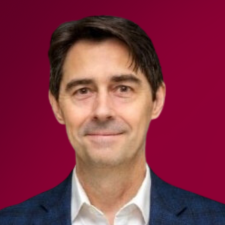 Panelist: Andrew Garman
Panelist: Andrew Garman
Professor, RUSH University
Senior Leadership Development Advisor, IHF Geneva Sustainability Centre
Andrew is a professor of health systems management at RUSH University in Chicago and senior leadership development advisor with the International Hospital Federation’s Geneva Sustainability Centre (GSC). He has contributed to more than one hundred research articles, book chapters, major reports and books on a breadth of leadership development and foresight topics. His most recent book, Healing our Future: Leadership for a Changing Health System, emphasizes the catalytic role of healthcare institutions in addressing complex social challenges including preserving a healthy planet. Andrew received his bachelor’s in psychology and mathematics from Penn State, master’s in personnel and human resource development from the Illinois Institute of Technology and PsyD in clinical psychology from the College of William & Mary/Virginia Consortium.
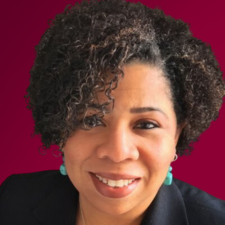 Panelist: Gerrin Cheek Butler
Panelist: Gerrin Cheek Butler
Deputy Director, Office of Health Protection
Illinois Department of Public Health
Gerrin Cheek Butler is the deputy director of the Office of Health Protection for the Illinois Department of Public Health (IDPH). Under the leadership of the IDPH director, Gerrin is working to reduce injury and illness from environmental factors and improve health outcomes for Illinoisans. Gerrin is a Chicago native living in Springfield and has worked in environmental public health for more than 25 years. Gerrin has concentrated her work in the areas of lead abatement, vector-borne diseases, food and water safety and food establishment regulation.
Gerrin studied environmental health at Illinois State University and has a master’s of public administration from Southern Illinois University, Edwardsville. Gerrin has a background in predictive analytics and quality improvement. Gerrin has recently become involved in addressing climate-driven environmental factors, environmental justice and building community resiliency.
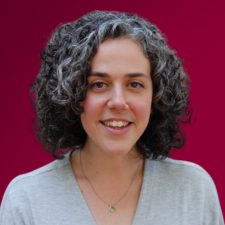 Panelist: Nancy Kohn
Panelist: Nancy Kohn
US Eastern Regional Director of Innovation & Equity
Health Care Without Harm
Nancy Kohn brings more than 15 years of multi-sector experience to her role as eastern regional director of innovation and equity with the healthy food in health care team at Health Care Without Harm. In partnership with the healthcare sector and various community allies, she and her team develop scalable models that support the transformation and sustainability of local and equitable food systems that support a resilient and stable climate.
Previously, Nancy held leadership roles in Philadelphia nonprofits and New York City government spanning nutrition education, community and school gardening and food policy, working in partnership to bridge government with the collective power of communities to improve food and land security. Nancy has created and delivered training for staff and communities locally and nationally, as well as shared best practices internationally. In 2016, she established a consultancy rooted in social and racial justice that works with NGOs, government agencies and nonprofits of all sizes to plan and implement strategies for transformational growth. She holds a BA in political science from Temple University and a master’s in health education from Columbia University, and she received a certificate in diversity, equity and inclusion from Cornell University.
Panel: Reducing healthcare’s carbon footprint
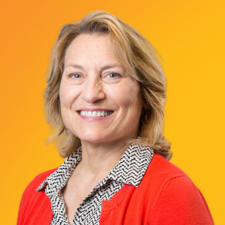 Moderator: Nancy C. Tuchman, PhD
Moderator: Nancy C. Tuchman, PhD
Founding Dean and Professor, School of Environmental Sustainability,
Loyola University Chicago
Dean Tuchman’s vision for the School of Environmental Sustainability (SES) is to raise public awareness of the unsustainable consumption of Earth’s natural resources and production of pollution waste with the goal of transforming behavior, developing policy, and inspiring and preparing the next generation of science-based environmental leaders. To that end, SES engages students, faculty, staff, and administrators in activities designed to lower our campus consumption of energy and natural resources and reduce our waste production. Under Tuchman’s direction, SES has developed seven interdisciplinary undergraduate programs, launched a master’s degree program in environmental science and sustainability, doubled the full-time faculty, and expanded student enrollment in these programs to over 500. In addition, with Tuchman’s leadership, SES faculty and staff promote a problem-solving, experiential learning pedagogy through several flagship co-curricular programs. For example, the SES biodiesel program engages students in converting waste vegetable oil into fuel that powers Loyola’s intercampus shuttle buses. Glycerin, a byproduct of biodiesel production, is used to produce soap used in campus bathrooms. In addition, the SES urban agriculture program offers students hands-on experience with sustainable food systems.
Tuchman’s 21-year leadership in environmental sustainability has put Loyola in the top 5 percent of greenest colleges in the nation. Building sustainability at Loyola earned Tuchman the Chicago Magazine Green Award (2013), Chicago EcoChampion (2018), and the St. Canisius Medal for Extraordinary Service to Jesuit Higher Education (2022).
Tuchman’s research focuses on human impacts on aquatic ecosystem structure and function. Her work has spanned from investigating the effects of greenhouse gases on stream ecosystem food webs to exploring the impacts of invasive plant and animal species on Great Lakes coastal wetland ecosystems. Working with students in research is one of the most rewarding aspects of Tuchman’s career. Throughout her 35-year career at Loyola, she has mentored or co-mentored 87 undergraduates and 45 graduate students in individual research projects. In 2023 she was selected as a Society for Freshwater Sciences Fellow for her lifetime contributions to lake, stream, and wetland research and her accomplishments in environmental sustainability in higher education.
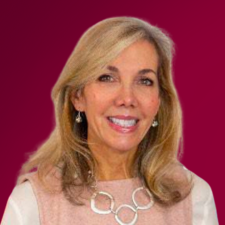 Panelist: Allyson Hansen
Panelist: Allyson Hansen
Chief Executive Officer & Executive Director
Illinois Medical District
Allyson Hansen, MHA, CPXP, has extensive experience leading complex healthcare organizations, ensuring they reach their potential to deliver high-quality care, while elevating the patient experience, improving operational efficiency and ensuring financial stability.
As the chief executive officer and executive director of the Illinois Medical District (IMD), Hansen is responsible for strategic planning, project implementation and daily operations. As its CEO, Hansen leads the IMD during a time of explosive growth and innovation, supporting a vibrant healthcare ecosystem that includes four major anchor medical institutions, two universities and more than forty health-related facilities and nonprofits. She also fosters collaborative relationships among the partners and stakeholders across the 560-acre healthcare hub.
Over the past two decades, Hansen planned and administered healthcare services across Chicagoland at UChicago Medicine, Loyola Health System, UI Health and Advocate Health Care. Prior to joining the IMD, she was managing partner of The Red Penny Group, advising national healthcare systems, medical groups and investors on growth, integration, operations and strategic plans.
Hansen holds both a master of health administration and bachelor of arts in psychology from the University of South Carolina, is trained in Lean Six Sigma and change management and is a certified patient experience professional. As a co-active coach and graduate of the Disney Institute for Healthcare Leadership, Hansen positions companies to lead with their heart. Hansen is an active volunteer and serves on the president’s council for Chicago Lighthouse and the board of the West Central Association Chamber in Chicago. Hansen lives in La Grange, Illinois, where she serves on the community advisory council of Lyons Township High School.
 Panelist: Geneva Brown
Panelist: Geneva Brown
Global Environment, Social and Governance and Diversity, Equity and Inclusion Lead
Cigna
Geneva Brown joined the Cigna Group in 2018 and serves as the global head of environment, social and governance (ESG) and diversity, equity and inclusion. In this role, Geneva is responsible for the development and execution of the enterprise’s ESG strategy to transform the health ecosystem into one that is well-functioning, sustainable, accessible and equitable for all. In addition, Geneva is the lead legal advisor and corporate secretary for The Cigna Group Foundation, providing counsel for charitable giving and community engagement initiatives.
Previously, Geneva was the attorney for The Cigna Group board of directors and executive management for corporate governance matters. She was responsible for legal oversight of Cigna’s shareholder engagement and securities trading practices as well as legal subject matter expert for enterprise organizational structure and subsidiary management. Geneva also supported corporate transactions for Cigna, including mergers and acquisitions and venture capital investments through the Cigna Group Ventures.
Before joining The Cigna Group, Geneva practiced law at Dechert LLP representing clients in private equity, healthcare and life sciences matters, and was federal law clerk for the Eastern District of Virginia.
Geneva received her JD from the University of Pennsylvania Law School, her master’s in bioethics from the University of Pennsylvania Perelman School of Medicine and her bachelor’s in English literature and French studies from the University of Pennsylvania School of Arts & Sciences. She is also an Eisenhower Fellow and serves on the board of directors at the Education Law Center. She lives in Philadelphia with her husband and infant daughter.
 Panelist: Dr. Peter Orris
Panelist: Dr. Peter Orris
Professor of Environmental and Occupational Health Sciences, University of Illinois School Public Health
Senior Attending Physician of Occupational and Environmental Medicine, UIC Hospital and Health Sciences System
Executive Committee, Illinois Clinicians for Climate Action
Professor Peter Orris, MD, MPH, FACP, FACOEM, is a professor of environmental and occupational health sciences at the University of Illinois School of Public Health and is a senior attending physician of occupational and environmental medicine at the UIC Hospital and Health Sciences System, part of a World Health Organization Collaborating Center at the University. He holds professorships on the faculties of the Northwestern and Rush Medical Schools in preventive and internal medicine.
Dr. Orris has served as an advisor to the World Health Organication, Pan American Health Organization, as well as federal, state and local governments, environmental organizations, labor unions and corporations. He served on the State of Illinois’ board of health for a decade and the US/Canadian health professionals task force of the International Joint Commission for 16 years.
He is a member of the American Medical Association and has been a representative on the Council of the Chicago Medical Society and a delegate to the Illinois State Medical Society for several decades. He currently co-chairs the Environmental Caucus of the World Medical Association and is a liaison for the American Public Health Association to the World Federation of Public Health Associations. He is a board member of both Chicago Physicians for Social Responsibility and Chicago Physicians for a National Health Program and an executive committee member for the Illinois Clinicians for Climate Action.
Additional resources
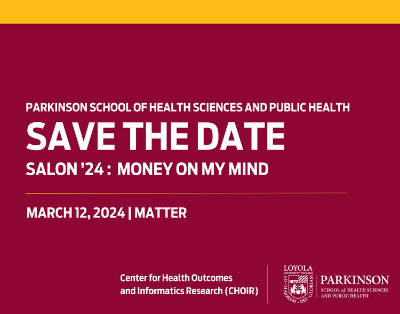

Learn more about careers in social impact. Join the Baumhart Center and Socially Responsible Chicago in person on November 15, doors open at 8:00am with the program from 8:30-9:30am. Register here.
Do you thrive at the intersection of profit and purpose? Join the Baumhart Scholars MBA, a cohort based program 100% focused on social and environmental impact. Learn more at a virtual information session on December 14 from 12:00-1:00pm. Register here.
Health, Equity, and Nature: A Changing Climate in Lake County, IL. Download the report here.


